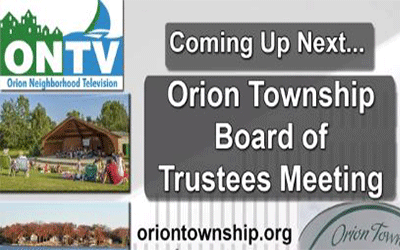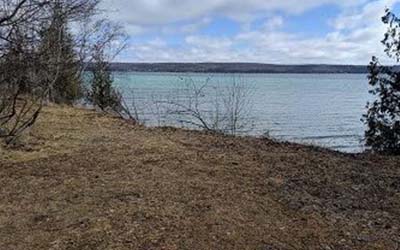May 20, 2021
Contact: Michael Michalek, 517-331-8387 or Scott Goeman, 517-284-5972
Great Lakes frontage, acres of forest, prime residential lots – these and more DNR surplus lands available at online auction
 Keeping your eyes open for the right piece of Michigan property? Don’t miss the current auctions of surplus public land from the Department of Natural Resources. Keeping your eyes open for the right piece of Michigan property? Don’t miss the current auctions of surplus public land from the Department of Natural Resources.
After careful consideration of properties it manages on behalf of Michigan residents, the DNR has selected 10 that are much better suited for private ownership. The department is preparing these surplus properties – in Antrim, Baraga, Benzie, Berrien, Delta, Gogebic, Midland and Oakland counties – for sale via online auctions open now through June 15 and 16.
Scott Goeman, DNR Real Estate Services manager, said that while these properties no longer fit the department’s goals of efficient management and broad access to public outdoor recreation opportunities, they could fit nicely into potential bidders’ future plans.
“We are responsible for more than 4.6 million acres of public lands, and we regularly review those lands to evaluate how well they fit with our overall management strategy,” said Goeman. “Sometimes, it becomes clear that, due to a number of factors – for example, if a parcel is landlocked by private property, isolated from other DNR-managed land or doesn’t support optimum outdoor recreation opportunities – it makes more sense to remove that parcel from our management.
“Just because some properties are no longer right for the DNR, though, doesn’t mean they won’t be perfect for private ownership,” Goeman said. “These 10 properties available at auction right now offer a variety of landscape and natural features – lake frontage, river access and mature forests, for example – that should appeal to many different buyers.”
The parcels fall into three main categories: waterfront properties, larger-acreage properties and a few under an acre in size. |
Waterfront properties
- Antrim County: 2-plus acres with 200 feet of frontage on the western shore of Torch Lake.
- Baraga County: An abandoned church parcel (just under an acre), near L’Anse, with 225 feet of frontage on Lake Superior.
- Delta County: South of Escanaba, a forested 2-acre property offers frontage along the western bank of the Ford River, about a half-mile upstream from Lake Michigan.
Room to roam
Anyone with dreams of a personal forest sanctuary in either the western Upper Peninsula or the heart of mid-Michigan might consider two of the auction’s biggest parcels:
- Gogebic County: A full 40 acres near Watersmeet.
- Midland County: A 60-acre Sanford property surrounded by private landowners.
Those looking for a bit less acreage that still offers a lot of space to explore outdoors can check out these options:
- Benzie County: Two separate, forested properties – 20 acres in Benzonia Township and 13 acres in Lake Township.
- Berrien County: In the southwestern Lower Peninsula along Red Arrow Highway, a forested 12.5-acre property in Lake Township, surrounded by private land.
Smaller gems
The saying “good things come in small packages” could easily apply to the auction’s final two properties – prime residential parcels each under an acre:
- Delta County: A 0.6-acre property along Lake Shore Drive, in Escanaba, with views of Lake Michigan south of town.
- Oakland County: A vacant, buildable lot – almost a half-acre in size – abutting a local county park in Groveland Township.
How the auctions work
The DNR is partnering with Sheridan Realty & Auction Co. to offer the properties through individual public auctions. Bidding on all properties is underway now, and people can continue to place bids until the end of each property’s assigned time listing on either June 15 (for Lower Peninsula properties) or June 16 (for Upper Peninsula properties).
Bidding for each property will close at the following dates/times:
June 15
11 a.m. – Torch Lake property, Antrim County
Noon – Lake Township and Benzonia Township properties, Benzie County
1 p.m. – Groveland Township property, Oakland County
2 p.m. – Sanford property, Midland County
3 p.m. – Lake Township property, Berrien County
June 16
11 a.m. – L’Anse property, Baraga County
Noon – Watersmeet property, Gogebic County
1 p.m. – Ford River property, Delta County
2 p.m. – Lakes Shore Drive property, Delta County
Throughout the auction, everyone will be able to see the current high bid for each property.
Visit sheridanauctionservice.com to get more information about the online auctions. Anyone wishing to bid on a property must create a bidding account through the Sheridan site.
Full property details, including each parcel’s legal description, acreage and location information, is available through the Michigan.gov/LandForSale webpage. Interested bidders are encouraged to review the DNR’s terms and conditions for land sales and auctions.
For more information about the sale of surplus, state-managed public land, contact Michael Michalek, resource specialist in the DNR’s Real Estate Section, at 517-331-8387. Auction proceeds will help provide future outdoor recreation opportunities in keeping with the DNR’s mission to conserve, protect and manage the state’s natural and cultural resources for the use and enjoyment of current and future generations.
DNR public land management
Much of the land offered in these auctions is isolated from other DNR-managed properties, which can create some challenges to efficient management. Other parcels are included because they offer limited public recreation benefits.
Public auctions are one way the DNR achieves the results of its routine review of public land ownership. The department is now conducting a comprehensive statewide review of DNR-managed public lands as part of the implementation of the 2013 Managed Public Land Strategy. Staff will evaluate 240,000 acres, county by county, on how well they support the DNR’s mission, and then recommend classification into one of four categories: retain in DNR ownership, offer to unit of government or conservation organization, offer for land exchange, or dispose (via auction).
Recommendations for the first 10 counties (Alpena, Berrien, Branch, Cass, Charlevoix, Chippewa, Dickinson, Gogebic, Leelanau and St. Joseph) under review are available at Michigan.gov/PublicLands under State Land Review. Public comments on the recommendations will be accepted until July 14, with final decision by the DNR director expected at the July 15 Michigan Natural Resources Commission meeting.
Note to editors: Accompanying photos of some of the surplus properties offered in the DNR’s public online auctions, open now through mid-June, are available below. Caption information follows.
- Baraga County – An abandoned church parcel, with 225 feet of frontage on Lake Superior.
- Antrim County – A 2-plus-acre parcel on Torch Lake with 200 feet of lake frontage.
- Midland County – 60 acres of vacant forested land with road frontage.
- Oakland County – A vacant, buildable lot in Groveland Township, adjacent to a county park.
- Delta County – A parcel with frontage on the Ford River near Lake Michigan.
- Benzie County – 20 forested acres near Platte Lake.
|







